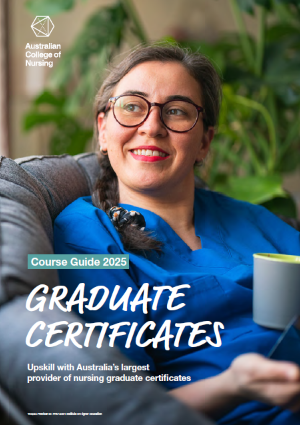On this page: Overview | Course rationale | Learning outcomes | Course structure | Entry requirements | Clinical placements | Fees and scholarships | Apply
Upgrade your nursing career in Child and Family Health Nursing
The Graduate Certificate in Child and Family Health Nursing aims to provide students with a sound understanding of child and family health nursing practice within a legal, moral, and ethical framework that reflects current models of care, government policy, and practice initiatives. Nurses working, or intending to work, in the specialty of child and family health require a clear understanding of primary health care, health promotion, parent-infant attachment, and the social determinants of health. Students will explore family dynamics and the importance of connections between the child, family, and community.
The quality of early relationships and the environment in which a child is raised significantly affects their mental health and well-being. Using a strengths-based, family partnership approach, child and family health nurses provide psychosocial and practical support and guidance to new parents while building capacity in their parenting skills.
Health and developmental screening and surveillance of infants and young children are significant components of child and family health nursing practice. The course focuses on feeding and nutrition, safety and well-being, and growth and development in the early years from birth to age 5. The role of the child and family health nurse as a central point of access to multidisciplinary community health services will be discussed, and students will undertake 80 hours of clinical placement to consolidate their theoretical learning and apply it to practice.
Course rationale
Working in child and family health practice requires specialist skills and knowledge to meet the increasingly complex healthcare needs of children and families in the community. The Graduate Certificate in Child and Family Health Nursing responds to industry requirements by preparing students for practice, developing their educational needs, and fostering the professional skills and attributes they require to optimise health outcomes for the child and family.
Learning outcomes
This course is designed to develop specific learning outcomes. Students will:
- Demonstrate the knowledge, skills and attributes required of the child and family health nurse in their speciality context, benchmarked against current research, policy guidelines and practice standards
- Examine the principles of primary health care, health promotion and the social determinants of health to support optimal health outcomes for young children and their families
- Apply a strengths-based, family partnership model of care to support mental health and well-being parenting capacity and infant-parent attachment
- Evaluate the impact of social, cultural, community and environmental factors on health and well-being of the child and family in the early years
- Analyse the evidence-based assessment and screening tools that support and monitor family & children’s health, safety, nutrition, growth, and development
- Appraise the role of the child and family health nurse as a central point of access to multidisciplinary and multicultural community health services, non-government organisations, resources, and networks
Course structure
The Graduate Certificate in Child and Family Health Nursing is a one year course, consisting of four 10-week terms.
Students will need to complete 4 core units. One unit is studied per term.
Approximate hours of study are 12 – 15 hours per week.
| Unit type | Unit name & pricing | Course codes |
|---|---|---|
| Term 1 - Core | Advancing Professional Practice (340), Tier 2 | |
| Term 2 - Core | Infant and Child Nutrition and Feeding (201), Tier 1 | |
| Term 3 - Core | Child Development in the Family Context (018)*, Tier 3 | |
| Term 4 - Core | Family and Child Health (040)*, Tier 3 | |
| *Units Family and Child Health (040) and Child Development in the Family Context (018) require 40 hours clinical placement each. | ||
ACN offers two intakes per year in January and July. Important dates including start and census dates can be found here.
Flexible intakes in April and October may be available, please contact our Customer Services team for further details.
Entry requirements
Admission to graduate certificate courses is based on academic merit and selection. In addition, applicants must satisfy any prerequisites or additional requirements specified for particular courses, including ACN’s general eligibility criteria.
All applicants seeking admission are required to:
- hold a Bachelor of Nursing or registered nurse* equivalent qualification
- hold current registration with the Australian Health Practitioner Regulation Agency (AHPRA); or the equivalent registering authority in your country of origin
- meet the Nursing and Midwifery Board of Australia English language skills registration standard (nursing and midwifery) – please refer to the AHPRA website to download the standard
- have a minimum of one year of postgraduate experience; and
- be currently employed in the clinical area of specialisation*
*The course contain a compulsory clinical placement component and do not require applicants to be employed in the clinical area of specialisation
Clinical placements
Anyone applying for an ACN course that includes a clinical placement must provide evidence of compliance documents at the time of application.
Applications for enrolment will not be progressed until all relevant documentation has been received by Customer Services.
Each Australian state and territory has its own clinical placement documentation requirements. Further details are available on our Clinical Placement Information page, click on the tab for your particular state or territory for information on specific requirements.
Individual placement providers may need additional documentation. If you are required to provide this then you will be contacted by the Clinical Placement Officer following enrolment.
ACN negotiates with health care facilities to secure clinical placements. ACN will make every effort to secure clinical placements within the timeframe indicated in the course outline, however applicants are advised that provision and location of clinical placements is dependent on the availability of placements within the health facility.
As placements are difficult to secure, once confirmed these cannot be negotiated unless there is unforeseen extenuating circumstances. Applicants are not to arrange their own clinical placements with a clinical facility under any circumstances. ACN reserves the right to change clinical placements if necessary.
Students from both the Metropolitan and Rural and Remote areas of Western Australia will need to complete a Pre-clinical Skills Workshop at Curtin University as a pre-requisite prior to undertaking clinical placement in that state. If students can provide evidence that they have already had training and are deemed competent in clinical skills pertaining to Physical Assessment; Developmental Assessment; and Growth Assessment of Children/Adolescents, this may be accepted in place of the pre-skills workshop. This evidence has to be presented to Curtin University’s Clinical Placement team for assessment.
More information about the clinical skills workshop can be found by following this link: https://payments.curtin.edu.au/CAA.
N.B. You can enrol into our course before completing this workshop but please be aware that clinical placement may be delayed if this pre-requisite has not been completed.
Fees and scholarships
| Tiers | 2025 Member price (10% discount) | 2025 Non-member price | 2026 Member price (10% discount) | 2026 Non-member price |
|---|---|---|---|---|
| Tier 1 | $2,403.00 | $2,670.00 | $2,460.60 | $2,734.00 |
| Tier 2 | $2,740.50 | $3,045.00 | $2,806.20 | $3,118.00 |
| Tier 3 | $3,539.00 | $3,932.00 | $3,623.80 | $4,026.00 |
| Tier 4 | $4,166.00 | $4,628.50 | $4,266.00 | $4,740.00 |
| *Graduate certificate / single unit of study fees are reviewed annually and are subject to change without notice | ||||
Fees are subject to change without notice.
ACN offers a flexible payment option allowing students to pay their fees on a term-by-term basis. Each term’s fees are due upfront, prior to term commencement.
FEE-HELP is also available for eligible students. Further information can be found here.
Want to save on course fees?
Being a part of the ACN community allows nurses to be the best they can be and strengthen the voice of nursing through a range of invaluable benefits, including 10% off graduate certificates and other education offerings, exclusive networking events, access to support and advice on ACN’s online engagement platform The Buzz, free online CPD courses and opportunities to be involved in shaping health care policy. Find out more and join our tribe today!
Find a scholarship to suit you
Discover our range of scholarships to support you to succeed in your studies regardless of your circumstances. Find ACN scholarships or ACN Foundation Grants and Awards.
Meet your Nurse Educator

Dr. Patricia Lowe MACN, Nurse Educator – Higher Education
RN, RM, BNurs, BPhil, GradDipMid, MMid, GC Neonatal Intensive Care Nursing, GC Child & Family Health Nursing, CertIVTAE, PhD (Nursing)
e: patricia.lowe@acn.edu.au
» About me
Trish coordinates our Graduate Certificates in Child and Family Health and Neonatal Care. Trish’s PhD thesis investigated the stressors and satisfiers impacting neonatal nurses’ professional quality of life. Trish is committed to advancing nurse leadership by equipping nurses and midwives with the necessary knowledge to meet their mandatory registration requirements, especially concerning their recency of practice and continuing professional development.
» Collapse
Hear from past students
Apply now
Please ensure you read all course information and make sure you meet entry requirements prior to commencing the application form.
Applications for enrolment will not be progressed until all relevant documentation has been received by Customer Services.
We strongly encourage applications from Aboriginal and Torres Strait Islander health care professionals to study this course. If you are an Aboriginal or Torres Strait Islander person we encourage you to let us know in your application. If you require assistance with completing your application or support during the course, please don’t hesitate to let us know.
Course codes:
10 006 2550 (January 2025 intake)
10 006 2552 (July 2025 intake)
Application form will open in a new window. Your privacy is very important to us. To better serve you, the form information you enter is recorded in real time.
Graduate Certificate attributes
Get valuable industry skills with a competitive edge. ACN supports our students to graduate with the following attributes:
1
Demonstrate enhanced professional, social and ethical understanding in a specialist area of practice.
2
Apply complex problem solving and information literacy skills to the development of evidence-based practice, research and policy reform.
3
Engage in behaviour that is culturally appropriate, safe and sensitive to the needs of people in their care.
4
Demonstrate an understanding of, and respect for, Australian Aboriginal values, culture and knowledge to build trust and improve health outcomes.
5
Combine advanced communication skills with an awareness of global health determinants to independently and collaboratively lead and educate others.
6
Reflect and think critically to be better able to care for self, improve health outcomes, and influence safe and effective professional practice.
Virtual Open Day
Jump online for Virtual Open Day to learn more about studying with the Australian College of Nursing (ACN).
Whether you are a nurse ready to upskill with a specialty graduate certificate or immunisation course, seeking an entry pathway to Masters or want to explore continuing professional development opportunities, this interactive event will answer all your questions.
Connect directly with experienced nurse educators and academics and discuss your career goals. Learn about how postgraduate study can shape your career, gain tips and tricks on preparing for online study and student life, all from the comfort of your own home.

Discover more course options from ACN
We’re here to help you every step of the way

For general information please contact:
Customer Services
t: (02) 9745 7500
e: customerservices@acn.edu.au
More information
General information
Important dates
Clinical placements
Postnominals
Frequently asked questions
- A Graduate Certificate typically requires the completion of 4 units (equivalent to 6 months of full-time study) or 24 credit points.
- A Graduate Diploma generally involves 8 units (equivalent to 1 year of full-time study) or 48 credit points.
- A Graduate Certificate is an entry-level postgraduate qualification, offering foundational knowledge in a specific area. It's often used for career advancement, upskilling, or transitioning to a new field. It is ideal for those seeking to enhance specific skills or qualifications without committing to a longer program. While a Graduate Diploma builds on the foundational knowledge of a Graduate Certificate, providing a deeper understanding and more advanced skills in the subject area.
- A Graduate Diploma is more expensive than a Graduate Certificate because it involves completing twice the number of units.
Each unit is worth 6 credit points, with a total of 24 credit points for the course.
You need to complete four units to obtain a Graduate Certificate.
A Graduate Certificate includes four units. The total cost depends on the Tier levels of the units. For example, a course with three Tier 1 units and one Tier 2 unit in 2025 will cost $10,680. Members receive a 10% discount on course fees.
Learn more about membership, its benefits and how to join.
Each unit has a different cost, indicated by its Tier level. You can find the specific fee amounts for each Tier level in the fee schedule.
Once you have receive the offer letter and accepted the place, you will receive the invoice for the unit fees. You can pay via bank transfer (details provided in the invoice) or by calling (02) 9745 7500 during business hours (8:30 am – 5:00 pm) to pay over the phone.
No, Commonwealth Supported Places are not offered for Graduate Certificate courses. However, FEE-HELP is available for eligible applicants. To see if you are eligible for FEE-HELP, please go the Australian government Study Assist website.
No, Graduate Certificate courses and single units of study have fixed start dates. There are four terms per year: January, April, July, and October. Check the Important Dates section on the website for details.
The course is typically completed in one year (one unit per term. If you would like to take leave during your study, you can take up to three consecutive terms of leave if you have enrolled in at least one unit. However, you must finish the course within two years.
No, there are no exams. The course and assessments are delivered online. Please note some courses may require mandatory in-class attendance or (off-site) clinical placements. For more details, please see individual course pages.
No, once you are enrolled in the course, you can access the online learning platform anytime to access the course material, offering flexibility for students balancing work and family commitments. However, assessments are only available during specific periods and must be completed within the allocated timeframe. The online course is supported by course coordinators, unit coordinators, tutors, and library staff, who offer access to resources such as books, journals, and databases.
Note: The Graduate Certificate in Nursing (Re-entry) is an exception and has both mandatory on-campus classes as well as clinical placements.







